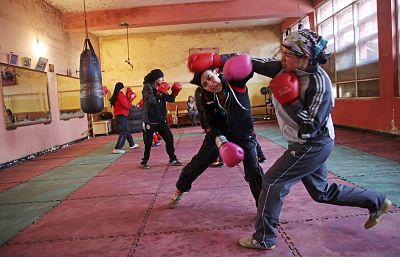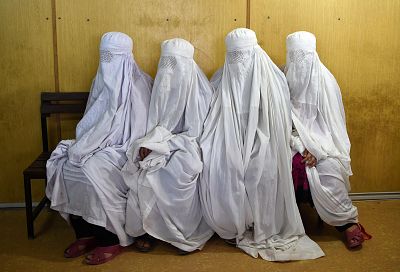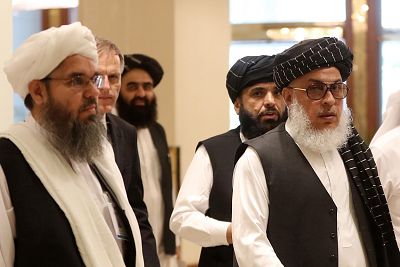The U.S. said safeguarding Afghan women's rights was part of the reason to fight the Taliban. Now rights advocates fear women's hard-won gains are at risk.
WASHINGTON — The United States once vowed to liberate Afghan women from the draconian repression of the Taliban but a planned deal between the U.S. and the insurgents offers no protections for the country's women, who fear their hard-won rights could be lost.
The proposed U.S.-Taliban deal, which the Trump administration said Friday will be signed on Feb. 29 after a partial truce goes into effect, would set out a timeline for the withdrawal of American troops in exchange for the Taliban renouncing terrorism and entering into peace talks with the Afghan government. But the agreement provides no guarantees for preserving women's rights or civil liberties now enshrined in the country's constitution, which the insurgents do not recognize.
The Trump administration, anxious to pull U.S. troops out of America's longest war, is treating the issue as an internal matter to be hammered out among the Afghans in future peace talks, which are supposed to start once the U.S.-Taliban deal is signed.
The United States would "support whatever consensus the Afghans are able to reach about their future political and governing arrangements," Molly Phee, the U.S. deputy special representative for Afghanistan reconciliation, said on Tuesday at an event at a Washington think tank.
For years, the U.S. promoted the idea of safeguarding Afghan women's rights as a part of the rationale for its fight against the Taliban, a cause first championed by President George W. Bush.
But President Donald Trump's impatience with the U.S. troop presence in Afghanistan, and the uncertainty surrounding a potential peace process, could jeopardize two decades of progress for Afghan women, who have gained a foothold in the workplace and in political life, rights advocates, Afghan officials and former U.S. officials said.
"The question is whether peace will come on the backs of women," said author Gayle Tzemach Lemmon, who wrote The Dressmaker of Khair Khana about an Afghan woman's struggle for dignity under Taliban repression.
Under the Taliban's extremist rule from 1996 to 2001, women were barred from attending school, holding jobs, taking part in politics and leaving their homes without a male escort. Violators were flogged in public, beaten or stoned to death. Since U.S.-led forces toppled the Taliban in 2001 after the 9/11 attacks, Afghan women have experienced a sea change in their status.
In the past two decades, women have entered universities and the workplace in unprecedented numbers, with dozens of women holding seats in parliament and thousands serving as teachers, doctors and even police officers. The country's culture also has evolved, with annual surveys showing an overwhelming majority of Afghans now supporting women's right to work and to education.
But in areas of the country where the Taliban retains control, women face severe restrictions and have come under attack for trying to go to school, according to human rights groups.
"We've already seen the oppression of women and girls return where the Taliban has regained control," Sen. Jeanne Shaheen, D-N.H., a member of the Senate Foreign Relations Committee, told NBC News. "We should not risk unraveling the progress that's been made."
Belquis Ahmadi, an Afghan-born human rights expert who has worked with the U.S. Agency for International Development, said she is concerned about the fate of women in a future peace settlement with the Taliban. To protect the progress made, Ahmadi said the U.S. and other foreign governments need to pressure the Taliban and the future Afghan government to uphold fundamental rights for women.
"We the international community — especially the U.S. — can and should use leverage over them," said Ahmadi, a senior program officer at the U.S. Institute for Peace. "What the Taliban want is recognition that they have evolved. I think we should not give them that recognition without abiding by rules and respecting international laws and treaties."
Secretary of State Mike Pompeo and other U.S. officials have said future U.S. and international aid will be contingent on Afghanistan respecting rights for women and minorities. But the Trump administration has never made clear if the pullout of American troops would be contingent on a final peace deal or a commitment to preserving women's rights.
The State Department did not respond to a request for comment.
In the Qatari capital of Doha, an all-male Taliban delegation has held marathon talks with U.S. special envoy Zalmay Khailizad and other officials since November to work out the terms of the deal, which the Trump administration refers to as a peace agreement.
"Unfortunately, Afghan women have been excluded from the process so far," said Ahmadi.
When Sen. Shaheen grilled Secretary Pompeo in April last year over whether the administration was pushing the Taliban and the Afghan government to include women in the discussion, Pompeo said,"I hope the [Afghan] women will make themselves heard to their leadership."
In the peace talks that are supposed to follow the signing of the U.S.-Taliban agreement, it's not clear if women will play a prominent role in the Afghan government's delegation, which will include representatives in and outside of the government.
"I remain concerned about the future for Afghan women under any agreement with the Taliban, which is why I continue to press the administration to prioritize women's inclusion in this peace process," Sen. Shaheen said. "There is so much at stake."
The Taliban have offered vague suggestions that they will adopt a less draconian stance towards women than when they ruled Afghanistan, without offering details.
"They will have all their rights. Whether it is right for education or it is right for work, they will have it according to Islamic rules," a Taliban spokesman, Sohail Shaheen, said in an interview last year with NBC News. "So there will be no problem with that."
Under the terms of the U.S.-Taliban deal, which have not been released yet, American troops likely would withdraw over a period of years. Once all U.S. troops depart, many military analysts and former U.S. officers say the Kabul government would be hard-pressed to fend off the Taliban. It's not clear if the U.S. would still carry out air strikes in an emergency.
The Pentagon last year stopped releasing figures on how many districts were under Afghan government or Taliban control. The last reported numbers, in Jan. 30, 2019,showed the Afghan government controlled only 53.8 percent of all districts, while 12 percent were under Taliban control or influence, with the remaining 34 percent contested. This marked an all-time low for the Afghan government.
Despite the uncertainty over the country's future, Ahmadi said she has reason to be hopeful given the attitudes of younger Afghan women.
"The women of today are very different than my generation. They have been loud and clear they won't go back to the traditional roles, to go back to the earlier era when they were subject to public humiliation, flogging, and exclusion from social, political and economic rights," she said.
The female Afghan ambassador to the U.S., Roya Rahmani, declined to comment on the implications of the U.S.-Taliban deal but said, "The women of Afghanistan are extremely resilient."
After the U.S.-led intervention in Afghanistan following the 9/11 attacks, which ousted the Taliban regime for sheltering al Qaeda leaders, the Bush White House made the plight of Afghan women a top priority.
First Lady Laura Bush took over her husband's weekly radio address on Nov. 17, 2001 to call attention to the plight of Afghan women, calling for international condemnation of the Taliban's repression. The State Department at the time issued a report on "the Taliban's War Against Women."
President Barack Obama sought to scale back the U.S. military mission, but his first secretary of state, Hillary Clinton, highlighted women's issues and once told a meeting of female activists in Kabul that any peace deal "can't come at the cost of women and women's lives."
"Going back to 2001, the treatment of women by the Taliban in Afghanistan was one of the central tenets of engagement by the U.S. and coalition countries in Afghanistan," said Anita McBride, who served as chief of staff to Laura Bush and in other senior government posts. "Beyond defending ourselves and rooting out terrorism, there was a very real case for humanitarian assistance for women and children."
President Trump's daughter, Ivanka Trump, who has led a global initiative to empower women, told a conference on Afghan women in September 2018 in Kazakhstan via video message that "the United States stands stands side by side with the brave Afghan women and girls as they strive to create a stable and prosperous future for their children and families."
Afghan women have harbored fears for years that if the outside world lost interest in Afghanistan, their newly won rights would be lost, McBride said.
One moment has stuck with McBride during the closing months of the Bush administration. The First Lady held a farewell meeting with a group of female Afghan members of parliament in the Roosevelt Room at the White House. "One of them stretched her arm across the table to take Mrs. Bush's hand, and said, 'Please don't forget us.'"














